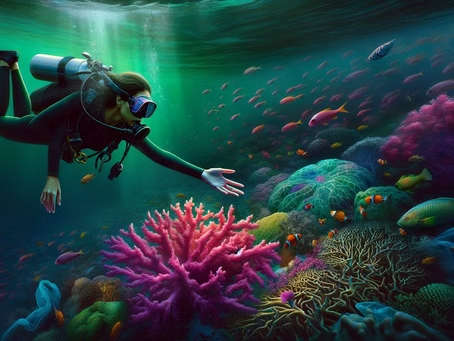Introduction
The health of our marine ecosystems is deteriorating at an alarming pace, with biodiversity loss and habitat degradation threatening the balance of ocean life. Deepwater species like sharks and rays, along with vital ecosystems such as seagrass and coral reefs, are in crisis. Urgent intervention is essential, combining science, policy, community action, and traditional knowledge to safeguard the oceans for future generations.
Sounding the Alarm for Deepwater Species
The Plight of Sharks and Rays
Studies reveal that one-third of deepwater shark and ray species face extinction due to overfishing and trade pressures. As keystone predators, their decline destabilizes marine ecosystems. Immediate steps must be taken to enforce protection, expand conservation measures, and increase public awareness.
- Strengthen enforcement of fishing restrictions
- Expand conservation coverage for vulnerable species
- Educate communities on their ecological importance
The Role of Global Custodianship
No nation can safeguard the oceans alone. International frameworks like UNCLOS and the SDGs call for collective custodianship, emphasizing cooperation, innovation, and inclusivity. True stewardship means not just signing treaties but implementing them with accountability and action.
Navigating Policy and Conservation
Translating Stories into Policy
Scientific data and conservation stories must inform actionable policies. Effective enforcement, backed by international collaboration and technological tools, ensures that marine protections are more than symbolic promises.
Balancing Economic and Environmental Needs
The blue economy seeks harmony between development and sustainability. Examples such as eco-tourism in the Galapagos and renewable ocean energy projects show how livelihoods and ecosystems can coexist when innovation drives solutions.
Strengthening Marine Laws
Marine Protected Areas (MPAs) remain vital tools, but success depends on enforcement. Strong penalties, robust monitoring, and community participation are essential to keep these safe zones effective.
The Deepwater Dilemma
Trade and Fishing Regulations
Slow-growing deepwater species cannot withstand unregulated exploitation. Regulations on catch limits, spawning grounds, and destructive fishing methods like bottom trawling are critical. International cooperation must enforce these rules consistently.
State Minister Sheryna’s Call for Action
State Minister Sheryna emphasized urgent reforms in ocean governance, highlighting the ocean’s role in sustaining island nations and global biodiversity. Her message underlines the need for decisive, collective stewardship.
The Human Factor
Our Impact on Ocean Cycles
While some argue ocean changes reflect natural cycles, evidence shows human-driven pollution and habitat loss are accelerating declines. Plastic waste, overfishing, and climate change tip the balance beyond recovery without urgent intervention.
Our Duty to Protect
Marine ecosystems sustain life on Earth, and protecting them is a shared responsibility. Supporting sustainable policies, engaging in conservation efforts, and adopting eco-conscious habits are crucial to reversing current trends.
The Overlooked Ecosystems
Seagrass and Coral Reefs
Often overshadowed by coral reefs, seagrass meadows are vital nurseries, carbon sinks, and erosion buffers. Integrating traditional knowledge with modern science enhances their protection and highlights their importance in climate mitigation.
- Protect seagrass in conservation policies
- Combine indigenous practices with research
- Use technology for ecosystem monitoring
The Triple Threat
Pollution and Plastic Waste
By 2050, plastic may outweigh fish in the ocean. Reducing single-use plastics, improving recycling, and supporting biodegradable alternatives are urgent priorities.
Overfishing
Marine resources are not infinite. Enforcing quotas, reducing bycatch, and banning destructive practices like bottom trawling are essential to restore fish populations and protect marine ecosystems.
Climate Change
Rising ocean temperatures, acidification, and shifting currents are devastating marine biodiversity. Coastal habitats like mangroves and seagrasses must be protected as natural defenses and carbon sinks.
Innovative Conservation
Technology and Monitoring
Tools like drones, satellite mapping, and interactive monitoring platforms provide real-time insights into ocean health, improving protection of MPAs and critical ecosystems.
Collaborative Research
Partnerships between governments, NGOs, and communities foster transparency and smarter strategies. Open data and joint projects amplify the effectiveness of conservation measures worldwide.
Charting the Path Forward
Immediate Priorities
- Reduce plastic consumption and waste
- Support marine NGOs and conservation projects
- Advocate for stronger protective laws
Building Global Coalitions
International cooperation remains the cornerstone of marine protection. Ratifying treaties, engaging diverse stakeholders, and building unified frameworks are key to lasting progress.
Conclusion
The fate of deepwater species, seagrasses, coral reefs, and countless marine creatures hangs in the balance. Urgent action—through policy, science, and individual choices—can reverse damage and preserve the oceans for generations to come. Together, we can answer the rallying cry of conservation and become true guardians of the sea.

